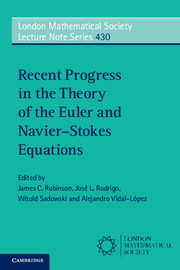Book contents
- Frontmatter
- Dedication
- Contents
- Preface
- List of contributors
- 1 Classical solutions to the two-dimensional Euler equations and elliptic boundary value problems, an overview
- 2 Analyticity radii and the Navier–Stokes equations: recent results and applications
- 3 On the motion of a pendulum with a cavity entirely filled with a viscous liquid
- 4 Modal dependency and nonlinear depletion in the three–dimensional Navier–Stokes equations
- 5 Boussinesq equations with zero viscosity or zero diffusivity: a review
- 6 Global regularity versus finite-time singularities: some paradigms on the effect of boundary conditions and certain perturbations
- 7 Parabolic Morrey spaces and mild solutions of the Navier–Stokes equations. An interesting answer through a silly method to a stupid question
- 8 Well-posedness for the diffusive 3D Burgers equations with initial data in H½
- 9 On the Fursikov approach to the moment problem for the three-dimensional Navier–Stokes equations
- 10 Some probabilistic topics in the Navier–Stokes equations
9 - On the Fursikov approach to the moment problem for the three-dimensional Navier–Stokes equations
Published online by Cambridge University Press: 05 January 2016
- Frontmatter
- Dedication
- Contents
- Preface
- List of contributors
- 1 Classical solutions to the two-dimensional Euler equations and elliptic boundary value problems, an overview
- 2 Analyticity radii and the Navier–Stokes equations: recent results and applications
- 3 On the motion of a pendulum with a cavity entirely filled with a viscous liquid
- 4 Modal dependency and nonlinear depletion in the three–dimensional Navier–Stokes equations
- 5 Boussinesq equations with zero viscosity or zero diffusivity: a review
- 6 Global regularity versus finite-time singularities: some paradigms on the effect of boundary conditions and certain perturbations
- 7 Parabolic Morrey spaces and mild solutions of the Navier–Stokes equations. An interesting answer through a silly method to a stupid question
- 8 Well-posedness for the diffusive 3D Burgers equations with initial data in H½
- 9 On the Fursikov approach to the moment problem for the three-dimensional Navier–Stokes equations
- 10 Some probabilistic topics in the Navier–Stokes equations
Summary
Abstract
In a series of papers Fursikov proposed a programme, based on analysing the moments of measure-valued statistical solutions, to obtain the density of initial data for which the corresponding solution of the 3D Navier– Stokes equations is regular. We illustrate the key points of the argument, and discuss some limitations of their method, by applying it to the case of the simple ODE ẋ +x−x2 = 0 for which we know that such a density result cannot hold.
Introduction
Despite intensive efforts, the regularity problem for the three-dimensional Navier–Stokes equations is still unresolved, and is therefore very interesting to consider alternative approaches to this well-established problem. In this paper we discuss one such approach due to Fursikov (1984, 1986a & b, 1987; see also Vishik & Fursikov, 1988), which treats not the equations themselves, but rather the linear ‘Chain of Moments’ (CoM) equations that arise when one considers the moments of statistical (measure-valued) solutions. If successful, the Fursikov programme would show that the set of initial data that give rise to regular solutions of the three-dimensional Navier–Stokes equations forms a dense subset of some sufficiently regular Sobolev space.
One can define a statistical solution by taking a measure on the space of initial data and then letting this evolve in a natural way under the flow induced by the equations. The moments of the resulting time-dependent measure satisfy a chain of infinitely-many linear equations, the ‘Chain of Moments’ (Section 9.3.1), and with enough regularity this implication can be reversed (Section 9.3.3). Proving the existence of ‘regular’ solutions to these equations is complicated by the fact that solving for the kth moment requires knowledge of the (k+1)th moment. Therefore Fursikov adopts a more roundabout approach, based on considering the equations within a variational framework and minimising a functional that penalises non-regular solutions: in this way they show that the CoM equations have a regular solution for a dense set of initial moments (Section 9.4). The essential difficulty in deducing a result on the ‘density of regularity’ lies in relating these approximate moments to a positive measure on the space of initial data, which we discuss further in Section 9.5.
- Type
- Chapter
- Information
- Publisher: Cambridge University PressPrint publication year: 2016

